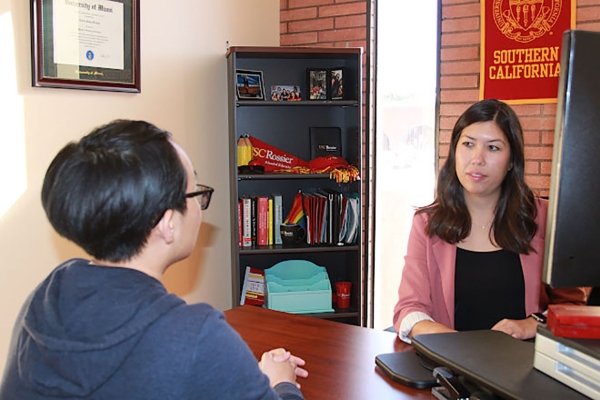When it comes to your grad school application, who better to guide you than the people tasked with reading it?
Every year, USC Rossier’s admission staff in the Office of Admission and Scholarships reviews hundreds of applications from prospective doctoral and master’s students.
They read personal statements, recommendation letters and resumes, searching for applicants whose interests align with program curriculum. As a result, they have a refined sense of what makes a great application.
So if you’re curious about applying to graduate school (whether it’s at USC Rossier or another university), we’ve outlined their expert tips for crafting a competitive application for admission.
Want additional guidance on your USC Rossier application?
|
|
Don’t stress over the ‘perfect’ grad school application
Good news: there is no secret to perfecting your grad school application. Don’t get caught up in chasing a formula for success.
“Let your voice show,” suggested admission staff. “[The application] is your own advocacy piece.” Schools seek to understand you holistically. In addition to prior academic performance, your application should include personal experiences and reflect you as an individual.
Pro tip: If you’re struggling to discuss relevant experience, focus on what you want to gain from your master’s or doctoral program. Research courses to see how they might benefit you personally and professionally. Review faculty and emphasize how your interests intersect with their area of expertise. Self-representation is key to creating a stand-out application.
Always refer to the school’s mission
Universities are typically mission-driven (a mission is a philosophy that drives the school’s approach to education). Make sure you incorporate the mission into all relevant parts of your grad school application. This includes your personal statement, letters of recommendation, essay, and anything else where you discuss yourself and your desire to attend the school.
It’s also a good idea to connect the college’s mission to your professional goals. For example, USC Rossier seeks applicants who are interested in educational equity. If you’re applying to the Doctor of Education in Educational Leadership (online) program, you may want to focus on how you plan to become an equity-minded leader.
Try not to overthink your grad school application
It’s important to revise and edit your application. Remember, depending on your program, readers may be reviewing hundreds of applications. Sloppy writing and incomplete answers are viewed as a reflection of your writing abilities and evaluated in the admission review. That said, don’t overdo it. If you’re hyper-focused on, say, the personal statement, you may overlook other parts of the application, which are also important.
You may also want to have someone else give feedback on your statements and essay responses. A different set of eyes can give you a fresh perspective, and possibly identify areas that need to be included, refined or cut. But think carefully about having someone else edit your content. Though well-intentioned, they may inadvertently dilute your voice.
Explore school resources
Have a question about your application? Finding the answer may be as easy as checking your graduate school’s website. To help students navigate the application process, colleges are increasingly adding crucial information online.
If your question is complicated, find out if your doctoral or master’s program has a dedicated admissions or enrollment management professional (and if you can visit campus to meet with them one-on-one). In addition to giving you personalized assistance, they can possibly recommend other resources.
If you have questions about the experience of being in your graduate program, or how others have successfully completed their applications, see if you can connect with student ambassadors.

Tell a story with your personal statement
A memorable personal statement includes a “professional and personal journey of how you arrived at wanting to pursue your degree, and what you hope to achieve by [enrolling] in the program,” said admission staff. The personal statement is an opportunity for you to demonstrate experiences that highlight your passion for your career, and how it aligns with the graduate school.
“Dig deep and be original.” Think about what inspired you to apply for your master’s or doctoral degree, but also remember that other applicants may have had a similar general experience. Be specific about your personal journey.
Great personal statements follow one simple rule
While there are best practices, there’s really only one rule for personal statements: Follow the instructions. Here’s a simple breakdown of common instructions for grad school application personal statements*:
- Mind the word count
- Don’t include supplemental attachments
- Answer all parts of the prompt
It’s easy to get caught up in the details of your response, but don’t overlook the big picture. You don’t want your application to suffer over a mistake that’s very much in your control.
Tailor applications to the individual school
If you’re considering a master’s or doctoral program, you’re probably applying to several schools. However, customize each application to the individual university.
“While essay prompts may be similar, be sure that you craft a response that is meant for that university (including the name of the university and/or program),” recommended admission staff. The same advice goes for letters of recommendation. “I have seen incorrect program names and universities on letters.”
Letters of recommendation should be personalized
No matter where you apply to grad school, you’ll likely need letters of recommendation. Typically, colleges require letters from people who can testify to your professional and/or academic experience.
Make sure you ask someone who knows you well. It may be tempting to ask a well-known professor whose class you took, or the CEO from a company in which you were employed.
However, if you don’t have a relationship with them, this would be a mistake. Their recommendation will probably sound generic. It’s better to ask recommenders who have a deeper understanding of you and your work, even if they have less impressive titles.
(If you intend to apply to grad school but aren’t sure who you’ll ask to write a letter of recommendation, identify a potential mentor now and start building a relationship.)
Read letter of recommendation instructions carefully
When it comes to your grad school application’s letters of recommendation, formatting matters. If recommenders are asked to submit a letter on organizational letterhead with a signature, instruct your recommenders to do so. It is your responsibility as the applicant to ensure letters are formatted correctly.
Guide your recommenders
Give the people writing your letters of recommendation some guidance. Don’t be shy about stating what you’d like them to include (as long as it’s accurate), and discuss your program so that they can tailor their letter. If you’ve been out of touch recently, remind them of topics you’ve discussed during office hours, your collaboration on past professional projects, etc.
You should also try to connect with them in person. “Take your recommenders out for coffee,” suggested admission staff. Unless you have a great, long-standing relationship, emailing a busy professor may not get their attention.
And remember to respect your recommenders’ time. Don’t ask them the day before your application is due and expect them to meet your deadline.
Use best practices for your grad school application resume
Resumes give you a chance to demonstrate your experience and accomplishments. You may want to stuff it with every minor win from your academic and professional history, but doing this can work against you.
Here are best practices for your grad school application resume:
- Include only top-level information
- Include relevant professional leadership experiences
- List employment in reverse chronological order
- Address employment gaps longer than six months in an optional essay
- Keep entries concise
- Emphasize accomplishments whenever possible
- Keep it to two pages (maximum)
- Check your spelling
- Use easy-to-read font and font size
Start your grad school application earlier than you think
Admission staff emphasizes that there’s no right part of the application to complete first. You can address the sections in an order that makes sense to you.
However, remember that letters of recommendation and transcripts are ultimately out of your control. You have to rely on others to complete these parts of the application, so give yourself plenty of time. Plan to have them submitted one or two weeks before the actual application deadline. While three letters of recommendation may not be required for your graduate program, consider requesting an extra letter as a back up.
And when it comes to transcripts, your individual school may have to wait for receipt and approval from the university due to school policy (yet another factor that can delay your application).
Curious about applying to USC Rossier? Learn more about our programs.
Grad school application FAQs
USC Rossier’s admission staff receive a lot of questions from prospective graduate students about their applications. Here are a few common questions:
What’s USC Rossier’s application acceptance rate?
Our acceptance rate varies based on the number of submitted applications in any given recruitment cycle. We recommend that you don't let an acceptance rate discourage you from applying to our programs.
What kind of scholarships and financial aid are available?
Graduate students are eligible for a variety of scholarships. Many students also use student loans to fund their graduate education.
Is my application complete?
Log in to your USC Rossier personal portal for updates on your application status (including missing items).
Can I visit campus?
If you’d like to meet with an admissions representative at the USC campus, select your program and contact us.
What if I have a low GPA?
Applications are viewed holistically so a low GPA doesn’t necessarily mean you won’t be considered for admission. However, if you want to demonstrate to the Admission Committee your academic potential for graduate studies, consider taking a class, the GRE or GMAT and addressing low grades or GPAs in an optional essay
What can you tell me that’s not on the website?
To familiarize yourself with the grad school experience, find out if you can sit in on a class. You’ll get a sense of class size, course material, and the students enrolled in your program.
I’ve been out of school for a while. Do I still need an academic reference?
No, but you’ll need two letters of recommendation from people who know you professionally.
*Check your program for any additional instructions




